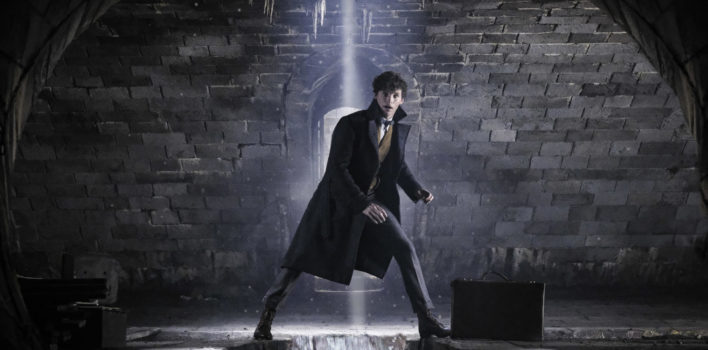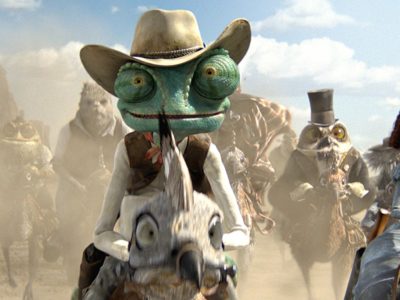Review| Fantastic Beasts: The Crimes of Grindelwald
 The universe that J.K. Rowling is building in the Fantastic Beasts series is at once fascinating, beautiful, and a terrifying mirror of our own, and The Crimes of Grindelwald turns each of those elements up a notch. It’s Harry Potter for people who have grown up with Harry Potter; a dark and grown-up adventure in a dark and dangerous world, with a little spark of magic (cinematically, narratively, and literally) that saves it from being oppressively dour. As the middle act of an inevitable trilogy, the stakes are high; but there are still small moments of joy and humor which retain some levity.
The universe that J.K. Rowling is building in the Fantastic Beasts series is at once fascinating, beautiful, and a terrifying mirror of our own, and The Crimes of Grindelwald turns each of those elements up a notch. It’s Harry Potter for people who have grown up with Harry Potter; a dark and grown-up adventure in a dark and dangerous world, with a little spark of magic (cinematically, narratively, and literally) that saves it from being oppressively dour. As the middle act of an inevitable trilogy, the stakes are high; but there are still small moments of joy and humor which retain some levity.
That said, it’s proven that 2016’s Fantastic Beasts and Where to Find Them was J.K. Rowling’s bold-yet-somehow-safe attempt to turn the “Wizarding World” into a cinematic universe beyond Harry Potter. It’s not a bad thing, but it is perhaps a bit telling about this film’s eventual purpose. And Crimes, while good, is not the best film in the nascent-yet-venerable Wizarding World.
The big thing is, the film is dense. Rowling is a novelist, not a screenwriter, and this is revealed most starkly in the fact that there’s really an unreasonable amount of story here for a film. The exposition is brief or missing entirely, characters move in and out without really being developed or explored, and the plot assumes you’ve seen the first film, not two years ago, but two hours ago.
 Crimes also suffers from some of the same unnecessary-ness as the original did: in her attempt to shoehorn a story about a wizard demagogue (and the resistance against him) into a lighthearted romp about unusual creatures with funny powers, Rowling has somewhat defanged the former while de-cuddling the latter.
Crimes also suffers from some of the same unnecessary-ness as the original did: in her attempt to shoehorn a story about a wizard demagogue (and the resistance against him) into a lighthearted romp about unusual creatures with funny powers, Rowling has somewhat defanged the former while de-cuddling the latter.
Still, it’s not all bad. Eddie Redmayne dials back Newt’s manic antisocialness in this installment from “almost unbearable” to “curiously odd,” reflecting some character growth since his first adventure and portraying the character more as a person on the autism spectrum than as a borderline jerk; and the rest of the cast turns in similarly solid performances (Depp and Law being particular standouts). The effects were glorious, the visuals were lovely, and the film wisely made much of the action Beasts-related, which made the set pieces more fun than just watching a couple wizards flinging glowy balls of light at one another. It solves most of my concerns with the first one, and sets up a sequel that I’m legitimately excited to see.
Part of that is because of the character development of Redmayne’s Newt Scamander and Depp’s Gellert Grindelwald. But to discuss that in more detail, I’m going to need to cast warningum spoilerus.
— Spoiler Warning: Spoilers for Fantastic Beasts: The Crimes of Grindelwald follow. —
The Crimes of Grindelwald
 Crimes builds up Scamander and Grindelwald to be polar opposites through-and-through: while Grindelwald seeks power through stirring up fear and anger in popular wizard culture, Scamander “[does] not seek power,” but rather, according to Dumbledore, “simply ask[s], ‘is a thing right?'” While Grindelwald uses the concept of love as merely a cover for his own hatred, Scamander has (as Lestrange compliments him) “never met a monster [he] couldn’t love.”
Crimes builds up Scamander and Grindelwald to be polar opposites through-and-through: while Grindelwald seeks power through stirring up fear and anger in popular wizard culture, Scamander “[does] not seek power,” but rather, according to Dumbledore, “simply ask[s], ‘is a thing right?'” While Grindelwald uses the concept of love as merely a cover for his own hatred, Scamander has (as Lestrange compliments him) “never met a monster [he] couldn’t love.”
Unfortunately, Grindelwald’s dire predictions and empty promises find purchase in the hearts of many wizards; including Queenie, Jacob’s beau who cannot marry him because he is a muggle. She’s taken in by his promises of a permitted love; though she does not realize that it will require her to snatch her freedoms from Jacob and his fellow no-majes; Grindelwald having promised that non-magical humans will be reduced to “beasts of burden” in his world, and that those who do not join him will die.
The Demagoguery of Grindelwald
Demagogues are no stranger to our non-wizarding world. And their position is utterly unbiblical. They stoke prejudice to gain support, flouting James 2. They feed fears to gain power, in defiance of Isaiah 41. But most of all, as Grindelwald does, they claim that only they can save people from the approaching disaster. And the book of Deuteronomy has a spell to counter that lie, too:
Be strong and courageous. Do not fear or be in dread of [your enemies], for it is the LORD your God who goes with you. He will not leave you or forsake you.
—Deuteronomy 31:6, ESV
Not Gellert Grindelwald. Not Donald Trump or Hillary Clinton. Not Beto O’Rourke or Ted Cruz. None of the above; your salvation and freedom from fear does not come from Earth, but from above it. And you’re going to have to decide what to do about the man who claims that only he can heal your people.
Picking a Side
Theseus Scamander: The time is coming when you’re going to have to pick a side.
Newt Scamander: No, I don’t do sides.
 The Bible makes it clear, over and over again, that humans are not our salvation; we cannot be saved by the actions of even the most powerful Human ruler. Worse still, any leader that tries will be taking the told of Jesus in a sweeping blasphemy against the purpose and goal of Jesus.
The Bible makes it clear, over and over again, that humans are not our salvation; we cannot be saved by the actions of even the most powerful Human ruler. Worse still, any leader that tries will be taking the told of Jesus in a sweeping blasphemy against the purpose and goal of Jesus.
They will have allied themselves with the enemies of God. And even if you “don’t do sides,” you can probably agree that “enemies of God” generally aren’t a group you’d prefer to be a part of.
So that means that you’ll have to pick a side, too. Don’t be swayed by honeyed words which feel right, or by promises to save you from threats you didn’t even know existed. Simply ally yourself with Jesus and with the truth.
And making friends with magical lock-picking plant creatures couldn’t hurt.







